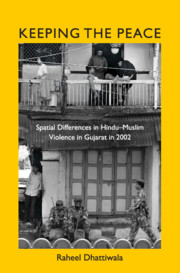Book contents
- Frontmatter
- Dedication
- Contents
- List of Tables
- List of Images
- List of Figures
- Preface
- Acknowledgements
- 1 Explaining Variation in Violence: An Introduction
- 2 Peace and Violence: Concepts and Theory
- 3 The Political Logic of Violence: Anti-Muslim Pogrom in Gujarat
- 4 Ahmedabad
- 5 Spatial Configuration: Variation in Violence across Neighbourhoods
- 6 Monitoring and Control in Two Peaceful Neighbourhoods
- 7 So Near, and Yet So Far: Group Relations between Victims and Perpetrators of Violence
- 8 The BJP's Muslim Supporters in Ahmedabad
- 9 Ethnic Violence: Connecting the Macro with the Micro
- Bibliography
- Index
Preface
Published online by Cambridge University Press: 26 April 2019
- Frontmatter
- Dedication
- Contents
- List of Tables
- List of Images
- List of Figures
- Preface
- Acknowledgements
- 1 Explaining Variation in Violence: An Introduction
- 2 Peace and Violence: Concepts and Theory
- 3 The Political Logic of Violence: Anti-Muslim Pogrom in Gujarat
- 4 Ahmedabad
- 5 Spatial Configuration: Variation in Violence across Neighbourhoods
- 6 Monitoring and Control in Two Peaceful Neighbourhoods
- 7 So Near, and Yet So Far: Group Relations between Victims and Perpetrators of Violence
- 8 The BJP's Muslim Supporters in Ahmedabad
- 9 Ethnic Violence: Connecting the Macro with the Micro
- Bibliography
- Index
Summary
In October 2001, I interviewed Ahsan Jafri, a Muslim politician, at his residence in Ahmedabad for the Times of India. Mr Jafri was an interesting man, I had heard—a former Congress minister, with a preference for communism, who expressed his abhorrence for militant Hinduism with the same vigour as he detested radicalization among his co-religionists. I was a freelance journalist then, writing occasionally on the city's freighted history of ethnic tensions and the extreme segregation I had grown up experiencing in my everyday life. It was just a month after the World Trade Centre bombings in the United States and my intention behind interviewing Mr Jafri was also to get a larger picture about the social ramifications of the event in India.
It is difficult, he told me, to profess liberalism in a society which sees the Hindu and the Muslim as primordial antagonists or ‘blood enemies’. His lament at the increasing thrust on dogmatic ritual within Islam had annoyed a considerable section of Muslims in his constituency who did not take his reformative aims very well. On the other hand, many Hindus incorrectly believed him to be a doctrinaire Muslim. On 28 February 2002, outside his home in Gulbarg Society in eastern Ahmedabad, Jafri was hacked and burned to death by a violent crowd of more than 5,000 Hindus, as the Ahmedabad Home Guards ‘watched and laughed’ (Human Rights Watch, 2002). His brutal murder at the hands of radical Hindus erased the complexity of religion and identity that he embodied.
Indeed, during my field research on the violence in Ahmedabad in 2010, and even earlier as a journalist, both Hindus and Muslims I spoke with would tirelessly favour the primordial argument. Hindus and Muslims fight, they would say, because ‘they are ancient enemies’. That the ‘enemies’ in some places choose to keep peace, despite the opportunity to engage in violence, was rarely noticed.
This book focuses on explaining why some places remained peaceful during times of extreme violence in 2002. It identifies the risk factors that led to different levels of violence across towns, villages, and neighbourhoods and, more comprehensively, factors that framed the behaviours of people who participated
- Type
- Chapter
- Information
- Keeping the PeaceSpatial Differences in Hindu–Muslim Violence in Gujarat in 2002, pp. xiii - xivPublisher: Cambridge University PressPrint publication year: 2019



